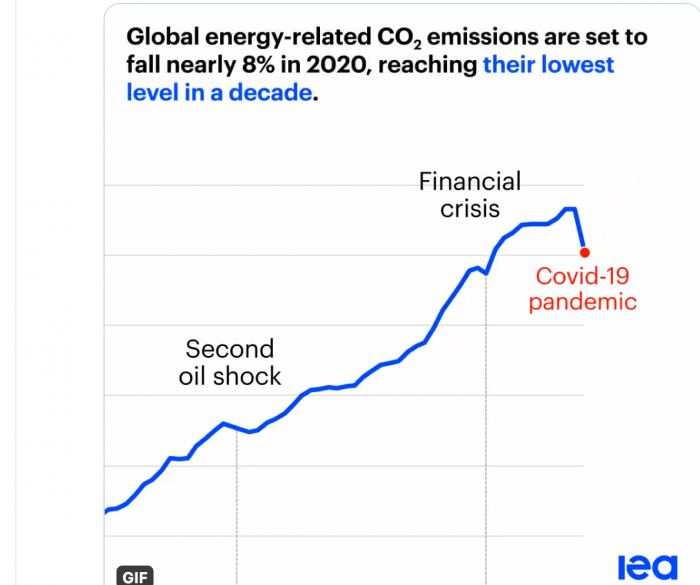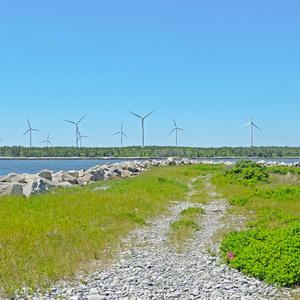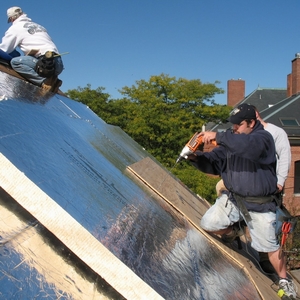
Carbon emissions in 2020 are headed for the sharpest drop ever recorded as the coronavirus pandemic rattles global energy markets, the International Energy Agency says in a new report.
Globally, the demand for energy shrank by 3.8% in the first quarter alone, compared to the same period in 2019, and steeper declines are expected as the pandemic continues to disrupt travel, industry, and commerce. A warmer than average winter also factored into the picture. The decline is seven times the drop recorded in the financial upheaval of 2008.
Greenhouse gas emissions also are headed for a huge decline—as much as 8% this year.
“If lockdowns last for many months and recoveries are slow across much of the world, as is increasingly likely, annual energy demand will drop by 6% in 2020, wiping off the last five years of demand growth,” the report said, “Such a decline has not been seen for the past 70 years.”
The report notes a 8% drop in demand for coal in the first quarter of the year as a result of industrial slowdowns. Travel restrictions, workplace closings, and less frequent use of personal vehicles all contributed to a 5% drop in the demand for oil in the first quarter. Even the output from the world’s nuclear power plants fell off as less electricity was used.
In the U.S., mild weather conditions was the major reason for an 18% decline in natural gas consumption.
While the fraction of coal in the global energy mix dropped by nearly 1%, to below 23%, the report found renewable energy experienced growth when compared to 2019, to nearly 13% of total worldwide energy production. The boost in renewable energy was attributed to low operating costs and preferential access to many power systems.
Impact on C02 emissions
In the first quarter of the year, global carbon dioxide emissions fell by 5% when compared to the same period last year. That included an 8% emissions drop for coal, 4.5% for oil, and 2.3% from natural gas.
The report said C02 emissions for the year are expected to fall by 8% over 2019 levels, making the total the lowest recorded in a decade. “The stunning declines in energy demand in Q1 2020 resulted in a major drop in global C02 emissions, surpassing any previous declines,” the report says.

The declines are good news for the world’s climate, although the emissions will have to drop that much every year for the next 10 years in order to limit global warming to 1.5°C and prevent the most serious consequences, NPR reported.
Fatih Birol, executive director of the IEA, warned that emissions would climb unless more successful policies are put in place. In a tweet, he said the 8% decline this year would be the largest drop in history, “but this fall, on the back of premature deaths & economic trauma, is nothing to cheer. The [world] needs structural emissions reductions driven by better policies.”
Renewable energy was a big winner in a market analysis from the research firm BloombergNEF. It said the falling costs of solar and onshore wind makes them the cheapest sources of new power development for two-thirds of the global population, Axios reported.
Renewable energy gains, but risks persist
The levelized cost of electricity for utility-scale solar and onshore wind dropped another 4% and 9% respectively since the second half of 2019, Bloomberg said. The cost of wind energy showed the sharpest drop since 2015 as the average size of turbines increased and the cost per megawatt fell.
Still, the pandemic is posing problems for the industry. The growth of new generating capacity will be slower, supply chains and financing have been disrupted, and falling costs for competing fuels—coal and gas—could keep them competitive for a while longer.
The Solar Energy Industries Association fears that it will lose half of the industry’s 250,000 jobs this year if nothing more is done to help.
Birol said the COVID-19 crisis threatens a transition to clean energy, and he urged governments to make clean energy a part of their stimulus plans as they try to restart their economies. In a statement, he said the time to act is now.
“Time is of the essence: this is the biggest economic collapse since the Great Depression,” Birol said. “Leaders are eager to move as quickly as public health constraints allow to start repairing the staggering damage suffered by millions of workers and businesses. Policy makers are having to make enormously consequential decisions in very short order…Given the size of today’s economic shock, the clean energy investment push will need to be done on a major scale.”
-Scott Gibson is a contributing writer at Green Building Advisor and Fine Homebuilding magazine.
Weekly Newsletter
Get building science and energy efficiency advice, plus special offers, in your inbox.















8 Comments
Will be interesting to see what precipitation patterns come about this summer. I believe it is thought that increased particulate matter in the atmosphere over the years was leading to greater rain events.
That doesn't bode well for wildfire season.
Just going from memory but it seems there was a correlation to heavy weekday traffic and heavy weekend rains. Not in Las Vegas but in the Midwest as I recall. Plumes from coal fired power plants could also be a factor in the heavy rain events. In the drought year of 2012 we had 3.8 inches of rain (West central MN) on July 24 as I recall. It is called training in weather terms, rain brings rain. It was a narrow band maybe 30 miles wide and 80 miles long, saved the local crops that year. We are downwind from a large coal fired plant in Central ND (Coal Creek Station) for what it is worth.
Everyone should watch Micheal Moore's new movie. Ouch.
No they shouldn't. The movie is garbage. It only encourages people to give up.
https://arstechnica.com/science/2020/04/michael-moores-green-energy-takedown-worse-than-netflixs-goop-series/
No, but they should read Bill McKibben's response: https://www.rollingstone.com/politics/political-commentary/bill-mckibben-climate-movement-michael-moore-993073/
I have commented on the original Q&A query on Michael Moore's new movie. My original assessment was that it totally goofed on solar, wind, (and batteries) not being relevant, but that it really illuminated some greed and co-opting of some historic environmental leaders. I also granted that the movie asked some good questions.
After doing some more reading, including the articles just mentioned, I have to revise my partial assessment of truthfulness of the movie. It is entirely despicable and misleading. It is very sad to me that Michael Moore has gone to the dark side, either knowingly or unknowingly. I suspect it is knowingly given all the opportunities he's had to learn about and correct the misleading innuendo in the movie. Very sad.
The corruption case against 350.org et al is completely overstated in that movie, all part of the sensationalism. There are several decently well-researched take downs of Planet of the Humans on YouTube. One of the better documented and shorter, (though still 29 minutes) versions detailing some of the most egregious intentional deceptions and sins-of-omission in is on Dave Borlace's "Just Have A Think":
https://www.youtube.com/watch?v=ZmNjLHRAP2U
The BS is too deep to make a really complete critique, but the apparent intent of Planet of the Humans is to provoke rather than illuminate (pretty much a staple of Michael Moore's brand (where nuance & fact get played pretty thin when convenient.)
Log in or create an account to post a comment.
Sign up Log in